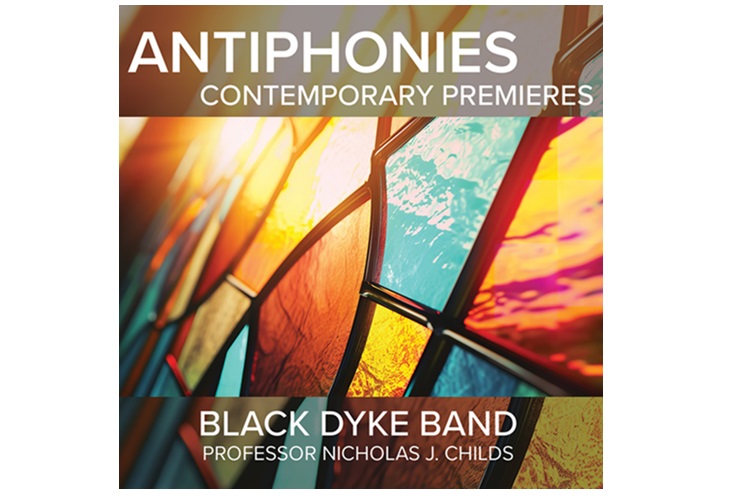

Black Dyke Band
Conductor: Prof Nicholas J Childs
Soloist: Daniel Thomas
Doyen Recordings: CD 445
Four original works linked to touchstones of time, style, place and personality provide the contrasting foundations on which this impressive release is built.
The historical arc spans the English Renaissance of William Byrd and Venice inspired Baroque of Vivaldi and Pergolesi, to the early European Romantic era of Beethoven and Chopin. The musical spirit is channelled through the amanuensis-like skills of Philip Wilby, Judith Bingham, Stephen Roberts and Oliver Waespi to give a 21st century connectivity that varies in strength and directness in personal tribute.
The original premieres were given at the 2022 World and 2023 European Championships in Kerkrade and Malmo, as well as the 2023 and 2024 RNCM International Brass Band Festivals in Manchester.
Compositional skill
Wilby’s ‘Beethoven’ is described as an ‘audio-visual guide to the brass band’. Although a variant idea on Britten’s famous ‘Young Person’s Guide’, his has a distinct ‘Yorkshire’ directness and wit – a ‘Plain Guide’ as he calls it of aural and visual effects built on the ‘Ode to Joy’ from the ‘Ninth Symphony’.
Wilby’s compositional skill is such that even this ‘blind’ hearing still offers so much enjoyment and clever explorative insight.
Although a variant idea on Britten’s famous ‘Young Person’s Guide’, his has a distinct ‘Yorkshire’ directness and wit – a ‘Plain Guide’ as he calls it of aural and visual effects built on the ‘Ode to Joy’ from the ‘Ninth Symphony’.
Stephen Roberts’ ‘Shades of the Soul’ is the most direct homage; the motifs from Chopin's famous ‘Nocturne’, ‘Etude in E major’, ‘Nocturne in Db’, ‘Andante Spianato’ and ‘Etude in B minor’ drawn together to form a portrait of terminal physical fragility yet iron-willed expression.
Although the brass band canvas does not offer the ability to display what Liszt described as Chopin’s ‘thousand shades’ of characterisation, his essential aesthetic imbues the music – lyrical tenderness set against supple eye-popping virtuosity.
Theatrical flourish
The 400th anniversary of the death of William Byrd saw Oliver Waespi produce his 2023 contest work 'Antiphones' based the motet ‘Sing Joyfully’. Explorations of Byrd’s struggles navigating a religious path in turbulent times are eschewed in favour of an inventive exploration of the motet’s structure, added to by a theatrical flourish of antiphonal and solo choreography (some specific, others not, in the score).
These outstanding ensemble performances are complemented by Judith Bingham’s atmospheric ‘Venice’ Euphonium Concerto, inspired by what the composer calls “a strange connection” felt to the person who last held a 13th century silver coin.
Subtle and ominous
Through its evocative imagery, Bingham draws us into a world of dreamy opaqueness and mystery; the listener led by a spectral gondolier through inky-black waters.
Daniel Thomas is the gloriously subtle, yet ominous soloist who acts like Charon, a figure of darkly enigmatic inclinations in taking his own coin in payment to ferry his customers on a canal tour to the outskirts of Hades.
This is a Venice of life and death, its dangers, comedy, beauty and ugliness linked almost supernaturally to the coin’s offering from the Doge to his city’s bride of the sea.
Daniel Thomas is the gloriously subtle, yet ominous soloist (the recording made during his time with the band) who acts like Charon, a figure of darkly enigmatic inclinations in taking his own coin in payment to ferry his customers on a canal tour to the outskirts of Hades.
Iwan Fox
Top purchase:
http://www.wobplay.com
CD: https://www.worldofbrass.com/102202
Downloads: https://www.worldofbrass.com/102202-download
Play list:
1. Beethoven (Philip Wilby)
i. Prologue
ii. Theme and Variations
iii. Fugue and Finale
4-7. Venice (Judith Bingham)
Soloist: Daniel Thomas
i. Sunrise with Barcarolle
ii. Pantalone and Friends
iii. Stabat Mater
iv. Marriage with the Sea, and Fanfare
8-11. Shades of the Soul (Stephen Roberts)
i. Lento
ii. Liberamente
iii. Allegro con fuoco
iv. Polonaise
12-15. Antiphones – on Themes by William Bryd (Oliver Waespi)
i. Vivace, ma non troppo
ii. Poco Adagio
iii. Vivace
iv. Andante









